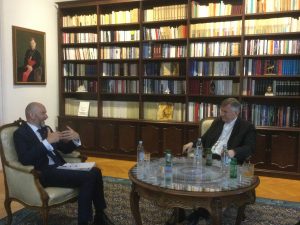The prosperity and security of Europe still matters to Global Britain, but it’s pursuing new partnerships outside the EU too.
The UK is reinforcing its commitment to European security, but is also developing new partnerships, such as AUKUS, which is designed to contribute to security and stability in the Indo-Pacific, Simon Thomas OBE, British Ambassador to Croatia, told Diplomacy&Commerce. He also said that hosting the 26th UN Climate Change Conference of the Parties (COP26) in Glasgow should be seen as part of the UK commitment to be not only the global leader on climate change, but also a problem-solving and burden sharing nation when it comes to tackling the greatest problems the world is facing today.

- What is the current situation with the Covid 19 crisis in the UK? Almost all the restrictions have been removed there, and so, in that regard, how do you look at what is happening in the rest of Europe and the world?
— The pandemic is sadly still not over for any of us. Even after all this time, case rates in the UK remain high. But the thing that increasingly allows us, and many other countries, to coexist with this terrible virus is vaccination. While vaccines don’t offer 100% protection against Covid, the UK experience shows clearly that they do have a huge impact on one statistic which really matters: whether you get seriously ill or die from the virus. So we’ve put a lot of effort into developing vaccines and encouraging people to get vaccinated. We’re very proud of the role that British laboratories and companies have played in developing life-saving Covid vaccines and rolling them out worldwide. And we’ve had real success with our domestic vaccination programme – more than 80% of the adult population fully vaccinated; more than 90% having had at least one jab. We certainly haven’t beaten Covid. But when it comes to difficult but crucial decisions about how to manage the risks we all still face from Covid in our dayto- day lives, about how to strike the balance between protecting our health and healthcare systems on the one hand and our economies and personal freedoms on the other, such a high level of vaccination in the general population gives confidence to policy-makers and individuals alike. In the UK it has meant that we have been able to lift many of the restrictions which have been part of our lives for the past year-and-a-half, including not only restrictions on things like meeting up indoors or holding large events, but also restrictions on international travel – much to the delight of the many Britons who have been able to again spend their holidays, safely, in Croatia this year. Not all restrictions have yet been lifted
– for instance we still have quarantine system in place for unvaccinated travellers or for those coming from the highest risk destinations globally, and many people are still working at least partly from home; but things are certainly beginning to feel more “normal”. When I look beyond the UK, it’s clear that many other countries are making good progress against the virus too, which makes me optimistic for the future, but there are still significant risks ahead and much to be done – for instance challenges around vaccine hesitancy and ensuring developing countries get access to the vaccines they need. As ever, international cooperation is crucial, and I’ve really valued the exchanges I’ve had in my first few months here with Health Minister Beroš and Interior Minister Božinović on this important issue. And I am pleased that both the UK and Croatia are both donating vaccine doses to countries that cannot get them otherwise, through the COVAX system. We have also been working together to fight fake news around COVID.  From an economic point of view, how much has the pandemic affected the UK economy and in which areas the most? What do the numbers show?
From an economic point of view, how much has the pandemic affected the UK economy and in which areas the most? What do the numbers show?
— Throughout the pandemic, the UK government has been clear it wanted to protect livelihoods as well as lives. That meant huge investment – £400bn (3.5 trillion kuna) since the start of the pandemic – in schemes designed to allow businesses to survive the economic disruption of the last 18 months and protect jobs that might otherwise have been lost. We are now starting to see the benefits of that approach, with latest economic data suggesting that the number of employees on UK payroll is in fact above pre-pandemic levels, and the overall economy on track to return to its pre-pandemic size this autumn. The OECD expects the UK to see the fastest GDP growth in the G7 this year. Inevitably, the pandemic has hit some sectors harder than others Not all individual businesses have survived. It has been a particularly challenging time globally for those in accommodation and food, or arts and recreation, for instance. But many of those are now bouncing back with the lifting of the vast majority of Covid- related restrictions on individuals and businesses in the UK. And others, in retail for instance, have adapted to the new context and developed online businesses. That’s consistent with the UK government’s own wider commitment to not simply seek to return to the ‘old normal’ after the pandemic, but to “build back better”, with significant investment in infrastructure, skills and innovation, supporting growth across the UK as well as our transition to net zero carbon emissions. Foreign investment numbers have also held up well during the pandemic, despite challenging global economic conditions – there were some 1538 FDI projects in the 2020/21 fiscal year and total inward FDI stock is second highest globally (behind only the US). As Ambassador, I am obviously particularly pleased to see that business ties between the UK and Croatia have also been strengthened despite the pandemic – whether that’s British investor New Bakery expanding their factory in Stupnik, or Mate Rimac opening a new research and development centre in Warwick.
- How do you assess the relations between the UK and Croatia, and how important is the joint struggle in these challenging times?
— I’ve been really struck since my arrival at the breadth of the partnership and the warmth of the friendship between our two countries. We’re like-minded Allies in NATO, with a range of practical co-operation on defence and security issues. Our armed forces train together, our security forces fight organised crime together. We share the same values and co-operate to tackle the same global challenges, from Covid-19 to climate change. That’s a big priority for our joint work at the moment, and a good example of where international partnerships are essential if we are to rise to the challenge. We had a good visit last month from the UK’s special envoy for climate, and I’m really pleased that Prime Minister Plenković will be joining other world leaders in Glasgow for the COP26 summit. We’re working together on innovation and education, and British and Croatian companies are working together to create jobs and mutual prosperity. But above all the strong relationship between the UK and Croatia are based on people-to-people links. Croatians who have
studied in the UK, Brits who have been here on holiday and have fallen in love with your beautiful country, Croatians who love British bands or follow British football teams, British music fans who come here for your festivals. Scientists who work in joint teams, teachers who share best practice. Businesses that cross the borders, bringing tastes of Britain to Croatia, but also the excellent olive
oil and prosciutto from Croatia to Borough Market in London. I have only been in Croatia for three months, but it is strikingly clear to me already just how much Croatians and Brits have in common: not least our sense of humour and our love for football, music, Goran Ivanišević, James Bond and good beer! I have seen for myself just how easily Croatians and Brits connect on a human level – British soldiers enjoying a BBQ and game of basketball with Croatian soldiers after their recent joint training in Gašinci, for instance. And wherever I have been during my short time in Croatia – from Split to Samobor, Varaždin to Vukovar – I have enjoyed a genuinely warm welcome from everyone I’ve met. - After Brexit, how do you see the relations between official London and Brussels, and in which direction will they develop? We see that passports for travel have been reintroduced; the UK also has problems with drivers, who used to come mainly from eastern European countries, etc.
— The last couple of years have inevitably been a tricky process of forging a new relationship, at least at institutional level, with Europe. Some issues are not yet fully resolved – on Northern Ireland, for instance, the arrangements initially agreed between the UK and the EU aren’t working in practice on the ground, with potentially serious consequences for political stability and security, and we need to find a way through that together. And the transition to new arrangements – whether for cross-border travel or customs and trade regimes – will of course take a bit of getting used to, especially with the additional complicating factor of Covid. There’s also no denying that
our exit from the EU has changed our national interests and the patterns of our international relationships. We will focus less on the balance of the debate within the EU and more on countries with which we trade directly and where our interests are engaged. But the UK has left the European Union, not Europe. We want the Member States of the EU to be prosperous and successful. Our countries and our societies are closely intertwined, not simply because of geography, but because of our shared history, shared interests and shared values. So while the UK intends to take advantage of our departure from the EU to seek new trade deals elsewhere in the globe, our trading relationships within Europe remain important. While the UK is pursuing new global partnerships for prosperity and security outside of the EU, in the Indo-Pacific for instance, our commitment to European security remains steadfast. We continue to be natural partners when it comes to tackling global challenges like climate or extreme poverty, or promoting human rights and democracy, or dealing with the legacy of conflicts in this part of Europe – all issues on which we are currently very actively engaged together. And we all benefit greatly from education and science partnerships which have developed over many years. It is so clearly in the interest of both sides to find a new equilibrium – even if it takes a while longer to get there. - What do you consider to be the biggest challenges for European security and where is the role of
UK? How to deal with new/ old challenges (migrants, climate change, region …)
— It’s clear that the nature and distribution of global power is changing. We’re seeing four overarching trends in the strategic context. There’s a geopolitical and geoeconomic shift, including China’s increasing power and the growing importance of the Indo- Pacific to global prosperity and security. We’re seeing an intensification of competition between states, and challenges to the international rules and norms which underpin our security and prosperity. Rapid technological change is reshaping our societies – and the nature of conflict. And the world is facing a number of serious transnational challenges which need our collective action and cooperation, the most urgent of which is climate change. Europe’s security challenges, and the responses, need to be seen against that backdrop: we need to be investing in the technologies and capabilities which will underpin our
security and prosperity in the future we need to work for the continued development of a global
economy in which open societies and open economies flourish, and stand up for our democratic values at home and abroad; we need to build and nurture strong international partnerships and alliances, and strengthen international institutions and the global system of co-operation between nations, so that we can prevent and resolve potential crises. That goes some way, I think, to explain what the UK is trying to do at the moment internationally under the heading of Global Britain.
Reinforcing our commitment to European security, but also developing new partnerships, such
as AUKUS, designed to contribute to security and stability in the Indo-Pacific. Continuing to play
an active role in conflict resolution around the world. Contributing to better global economic governance, through our role in the G7 and G20. And deepening our connections with the world’s largest and fastest growing economies, inclduing ASEAN and the Trans-Pacific Partnership (CPTPP). The UK is a global leader in development, for instance raising huge sums to support girls’ education. And, in only a few days’ time, we will host the 26th UN Climate Change Conference of the Parties (COP26) in Glasgow, not only as part of our commitment to be a global leader on climate change, but also to be a problem-solving and burden-sharing nation when it comes to tackling the greatest problems facing the world today. We’re asking countries to sign up to ambitious new targets and make ambitious new commitments at Glasgow – to limit emissions growth to within 1.5 degrees, to agree to phase out coal and phase in electric vehicles, to take action to halt and reverse the loss of trees and biodiversity, and to pledge money to help the rest of the world tackle climate change. We’ve been really encouraged by some of the early pledges – and it’s been great to see Croatia sign up to the Powering Past Coal Alliance, for instance – but there’s still a tough negotiation ahead. The climate challenge is perhaps the starkest reminder of how the fates of nations are all intertwined, and why now more than ever we need strong international partnerships and effective diplomacy.